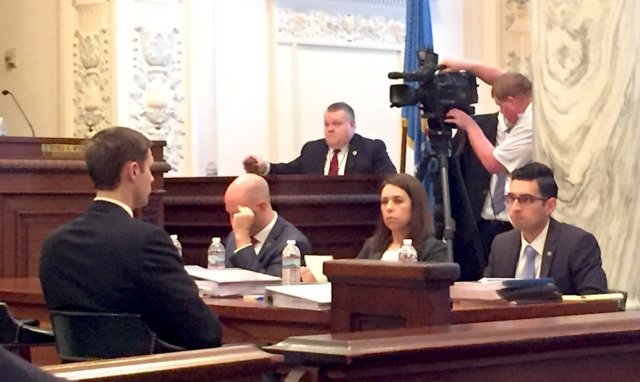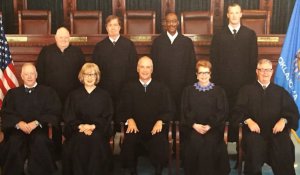
Less than 48 hours after hearing three lawsuits concerning the Oklahoma Legislature’s most recent budget agreement, the Oklahoma Supreme Court has decided in favor of cigarette companies who challenged the Oklahoma Smoking Cessation Act of 2017. The court ruled the cigarette fee unconstitutional.
All nine justices supported the decision at least in part. The court’s newest member, Justice Patrick Wyrick, wrote the majority decision:
All parties agree that if Article V, Section 33’s requirements apply to SB 845, the measure must be invalidated for failure to comply with those requirements. The question presented by this case is thus whether SB 845 is a “revenue raising” measure. We conclude that it is and was thus enacted in violation of Article V, Section 33.
The section referred to in the Oklahoma Constitution stems from State Question 640 that passed in 1992. It sets specific requirements for any “revenue bill,” which justices determined were not met by the Legislature’s last-ditch effort to increase the price of cigarettes by $1.50.
Also from the court’s decision Thursday:
“Revenue bill” is a capacious term; so very shortly after ratification of the original Constitution, we were asked to define it. In Anderson v. Ritterbusch, we held that “bills for raising revenue” are those “whose principal object is the raising of revenue, and not those under which revenue may incidentally arise,” and which “levy taxes in the strict sense of the word.” We have applied that two-part test in the years since to hold that measures “requiring payment of a tax or license fee for the privilege of operating [a] business” that profits from the use of State resources are not revenue bills, so long as the fee or tax is “merely incidental to the enforcement of the real [regulatory] purpose of the act.” And we have more recently excluded from the definition of “revenue bill” measures which will result in less revenue being collected, rather than more.
(…)
It is against this backdrop that we must evaluate SB 845 to determine whether it is the type of measure “intended to raise revenue” that people have mandated be enacted only through legislative super-majority or popular vote.
With the cigarette fee ruled unconstitutional, it will yield direct cuts of $70 million to the Oklahoma Health Care Authority, $75 million to the Oklahoma Department of Mental Health and Substance Abuse Services and $69 million to the Oklahoma Department of Human Services, according to information distributed by the Office of Management and Enterprise Services.
RELATED
‘If it looks like a duck’: Oklahoma Supreme Court hears budget lawsuits by William W. Savage III
As of publication of this post, GOP legislative leaders had not released statements on the court decision. But House Minority Leader and 2018 gubernatorial candidate Scott Inman (D-Del City) did.
“Once again, Gov. Fallin and Republican legislators have failed Oklahoma. My caucus and I sounded every alarm bell we could to stop this from happening, yet here we are, just as we warned,” Inman said in an emailed statement. “Today, I’m urging Gov. Fallin to call for a special session and for Republican leaders to come together with myself and Sen. (John) Sparks (D-Norman) and draft a truly bipartisan and constitutional budget plan that will help to restore, reinvest in, and rebuild Oklahoma.”
Shortly after 11 a.m., Gov. Mary Fallin released a statement:
“I am disappointed to hear the Supreme Court struck down the smoking cessation fee, but I certainly respect the justices’ authority. I will be discussing with legislative leaders from both parties the need to address the $215 million shortfall this will create for the Department of Human Services, the Department of Mental Health and Substance Abuse Services and the Oklahoma Health Care Authority, the three agencies that received the bulk of the money that was to be generated by the cessation fee.
“These agencies and the people they serve cannot sustain the kind of cuts that will occur if we do not find a solution. My belief is we will have to come into special session to address this issue.”
The court’s rulings on the other two 2017 budget agreement challenges are pending.
The full text of the majority court’s decision can be found below.
https://nondoc.com/wp-content/uploads/2017/08/OKSupremesCigaretteFeeRuling.pdf” height=”450px”]





















